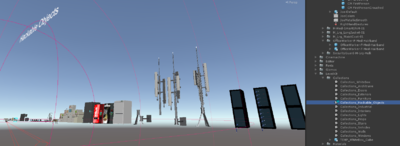Mission Object Set Up
Choose a Mesh
Take a prop that is going to represent your hack-able object and place it in your scene.
It can be anything really, but to to make full use of the options available either:
- Choose from the Hackable Devices Collection scene in LevelKit.

- Piece your own together from pre-made models and parts of models in the LevelKit>Models>Props>Devices and it's sub-folder 'ModularTechParts'
- or follow this guide to Modeling your own Hackable Devices
Add the Hackable component
Decide how you want it too behave in it's different states, as explained on the Devices page.
Eg. Amok() sets of a sparks particle effect RunOnce() spits out a sheet of paper
Create the corresponding effects, animations or behaviours you want and connect them to the corresponding Unity Events in the Hackable component
Add the MissionObject component
This is explained in more depth in the Mission Objects page, but essentially in this example we just need to add the MissionObject component and set it to 'Hackable'.
Setup a Lua Device Script
Follow this guide to Device Scripting to create a device script and set up the devices buttons to call the functions you setup in the 'Hackable' component.
Or even call anything else from the Lua Apis.
Add to your mission script and connect to networks
- Setup the device and point is to your Device Script as explained above
- Add the device
- Connect the device to a Network
Add item prop
When a NPC interacts with a hackable device sometimes that action needs some item to show on the NPC hand (for example: the soda machine makes a soda can appear on the NPC hand when the drinking animation is triggered). This item is set in the inspector, having a reference to the wanted object in the field 'Animation Item Prop', it's also possible to select the slot that the item will show (right hand is the default slot).